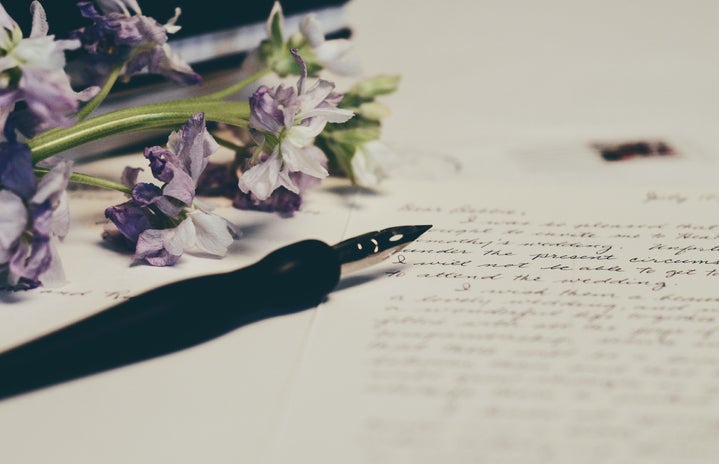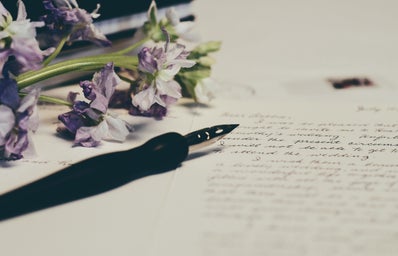Many people find themselves attempting to write in a journal or diary in their teenage years, be it because they were given a blank, lined book or because they heard about it somewhere and wanted to give it a try. However, it’s a habit that, for many, falls to the wayside in adulthood as one’s time becomes increasingly micromanaged and social media makes it so much easier to tweet a thought rather than write it in a book no one will ever see.
However, there are a lot of benefits to keeping a personal journal even past teenagerhood. I’ve been keeping one on and off for about eleven years now, and I think it’s a medium of writing that is criminally underrated. Here are some reasons why it might be worth trying it yourself.
- Journaling helps you manage your mental and emotional health.
-
According to a study involving college students, journaling has the potential to help people work through extreme stress and organize their own thoughts into something more solution-oriented. Journaling about your negative feelings is even linked, according to this study, to increased academic performance.
Speaking from my own experience, journaling has long been my go-to when I’m especially stressed or anxious. Even if I haven’t touched my journal in months, I might find myself pulling it out just to vent, and it always makes me feel a little bit clearer about what the actual problems are and what I need to do to solve them. It can feel like cleaning out the dust and cobwebs in the attic of your brain!
- Journaling allows you to work through emotions or experiences without fear of judgment.
-
Social media makes it really, really easy for us to share our every thought with the world. I see this all the time, be it in Tweets, Instagram stories, Facebook posts, or TikTok videos. While I won’t try to say there’s no benefit to this, as these feelings can be really important to share (such as with the #MeToo Movement) and can help build community and solidarity, it can be better sometimes to sit in your feelings and evaluate them before you share them.
This can help you clarify those emotions and present them in a more constructive, streamlined manner – should you choose to share them at all, as not everything needs to be.
Furthermore, you may find yourself never sharing your feelings, on social media or elsewhere. While specific circumstances can make it necessary to hold emotions in temporarily, doing so indefinitely can be harmful to your health and interpersonal relationships. As such, journaling is used sometimes in therapy, especially when processing trauma.
- Journals give you a space for self-exploration and discovery.
-
This is one of the primary reasons why journaling is so encouraged in teens, but we as people often are in a constant state of growth and change. If you aren’t sure of who you are or want to be, are considering making a change, or have any other reason to be unsure about your identity or the way you’re living, journaling can be beneficial as a private way to put those feelings to words, and to imagine a different way of conducting yourself.
Especially when in or having recently left an environment that may not allow for self-discovery, this can be a great way of working through that.
- Journals become a record of your personal history.
-
It can be really fascinating, in both a positive and negative way, to look back on old memories you’ve recorded, from events you witnessed to personal growth. In the same stroke, it can help you with your current growth to see where you’ve been and how you’ve changed in the time since. Though some memories may be painful to look back on, you might be glad you have a record of them one day in the future. And, of course, the good memories can be fun and nostalgic to relive.
It can also help you to remember your own memories more clearly, as memory is often unreliable and prone to fading with time.
- Journaling makes you a better writer and communicator.
-
After journaling for over a decade of my life, I can confidently say that journaling events, descriptions, and my own feelings has made me more adept at expressing myself in words. This has aided me both academically and in my personal relationships.
Additionally, journaling can be really helpful in learning another language, as it forces you to practice that language more and figure out who you are in that new language.
- There’s no wrong way to journal.
-
Though this article is focused primarily on personal journals recording your own life and experiences, there are other types of journals to consider as well, such as dream journals, nature journals, or bullet journals.
If you’re still not sure about journals or don’t know which one works best for you, I highly recommend this video by Answer in Progress, “why you can’t stay organized,” which especially focuses on bullet journaling.
Furthermore, aside from types of content, there are also different ways to record it. You can do it the classic way, handwritten on lined paper – but you can also type your journal if you find that easier or more accessible, and there are apps that allow you to have an audio journal/voice diary. I’ve even heard of sketchbook journals where you record your day and thoughts through small doodles and drawings.
- Journals don’t have to be perfect.
-
Especially if you’re a student or in a field of work involving writing, there is a lot of pressure for your writing to be perfect. Whether you are writing academically, for publication, or something else, the pressure can be intense.
As someone who loves writing, and regularly writes across a lot of different formats, I find journaling to be hugely relaxing. There’s no pressure to have good handwriting or to even spell things correctly. You can be messy or disorganized, and there’s no need to agonize over word choice or grammar.
Journaling allows you a space to let go of the rules that, while often necessary, can also be stifling or frustrating. This can be a great way to battle perfectionism, as well.
If this inspired you to give journaling a shot, then good luck and happy writing!



